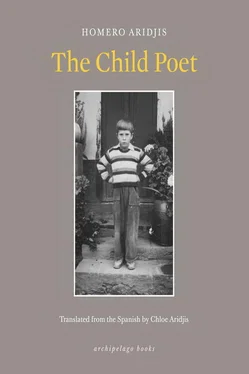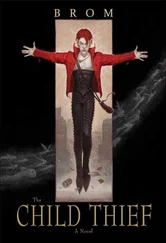One night, in a corner of the archway, hidden from passersby on the street, Luisa and I leaned against the damp wall and embraced. Her restless eyes strained to hear the sounds coming from the house down the alleyway that was only discernible by the white stones of its walls. All of a sudden Juan was standing in front of us, and in a shaky voice that probed the darkness and cross-examined the shadows, he called me by name.
As we went off, he pressed close to me and in a mysterious voice said, “Take this. Your brother sends it. Luisa’s cousin and four of his friends are in a cantina. He says he’s coming to kill you.”
I grabbed the object he held out to me. It was a knife. Slipping it under my belt I felt its cold touch, as if I’d put a frozen fish against my skin.
Juan left.
I didn’t go back to Luisa. She watched me from the archway, not daring to call out for fear of her father.
I spotted her cousin behind a post, with his friends in tow. Their foreheads were covered by hats. You couldn’t see their eyes. And their hands, hidden beneath their ponchos, were surely clasping weapons. They passed in silence, slowly, their steps resounding on the cobblestones. One of them belched drunkenly.
They didn’t turn to look at me. But I felt them measuring up my body out of the corner of their eyes.
Almost on their heels my brother arrived, with a pistol in his jacket pocket. He said we should get out of there.
Luisa’s cousin and his friends soon disappeared among the darkened houses at the end of the street.
Ricardo el Negro and Juan emerged from the murkiness of another archway. They asked us if the others were coming back. They never did.
On the night of Candlemas, seated around the bonfire we could hear the god of fire striding through the flames. Sitting between Juan and my cousin I listened to the ocote pine crackling and watched a newspaper expand and contract, as if eaten up by a golden tooth.
Behind us, Silvia and my cousin gazed at the tongues of fire, streaks of ochre quivering on their faces.
The smoke climbed the wall of a house and, once on the roof, was lost to the night.
My brother and Ricardo el Negro stoked the fire with handfuls of dry leaves that were quickly devoured and threw in pieces of paper that doubled over like bodies with a bellyache.
I pulled a y-shaped branch out of the flames and pointed it in all directions. The branch writhed like a person in pain. The fire consuming it was a flickering flower in the darkness. The air snatched sparks that fizzled out on the stones.
Four hunters, rifles slung over their shoulders, walked by on their way to the lagoon. With somber, silent faces, they looked as if they were about to execute someone.
Don Pedro, the postmaster, brought the mail to my father.
A solitary figure on the sunny street, he walked over slowly after lunch. His pants were too big for his skinny legs and his shirtsleeves, which didn’t reach his wrists, had shrunken in the wash.
After delivering the newspaper and letters at the store, he would buy a kilo of sugar, 50 grams of coffee, 100 grams of alphabet soup noodles, and one can of tuna. On his poor man’s face, at those moments of spending, the Pardaillan and Athos the musketeer, whom he had recently discovered, ceased to exist. He placed his coins on the counter as if he were being robbed, with a senile tremble of the hand and a somewhat hungry, helpless expression. Age had begun to tilt him forward, and fasting gave his face a gaunt, overwrought look.
The musketeer, as my mother called him, seemed too old and tired and breathless to tell any stories.
When he conversed with my father, he interrupted himself to ask whether he properly understood such and such a word, since it came from the dictionary. And he spoke so softly that you could only make out “ llán ban, le, la, nos, bas” between the coughs and pauses. Usually he left off whatever he was saying in the middle, promising to finish tomorrow, or think overnight about what he’d forgotten from the story.
Sometimes, when he encountered the doctor in our store he told him about ailments with such enthusiasm that he appeared to have every one he mentioned, and the more he had, the more delicate his health. And if an old woman, emboldened by the conversation, announced that her son had gotten pneumonia from going outside at night, the postmaster felt threatened and touched wood, grimacing as if he had a headache.
My grandmother used to say that her eyesight had grown sharper from peering in the dark and that she could tell a needle from a pin at night; that in the silence of her room she could hear the branches of trees in the orchard rustling in the wind; and that her body, kept alive from moment to moment for eighty years, would die in an instant.
Sitting at the window of her room, with an air of someone witnessing the light being extinguished from one thing after another around her — though in reality nothing was extinguished anywhere except in her eyes or in her appetite for things — as if everywhere dusk were about to fall, though the sun warmed the stones and sent shiverers to the shade — she looked at each person as though death were knitting funereal threads around him or her, as if the cobbler might stumble and die walking down the street, and the watchman could stop breathing and die in his sleep in bed, and the dog, scrawny with hunger, might bite my aunt Inés and give her rabies. Besieged from all sides by death, and lacking the energy to dodge the fatal organisms making their way towards her to strike, and without the strength to resist the germs floating in the air, swimming in the water, and poisoning the food, she detected signs of illness in the faces of others, and the onset of old age and omens of death. Her room creaked and the world threatened to collapse — although it was her body that trembled and her days that were numbered. For according to her, everything advanced towards its destruction and contributed to its own defeat.
And so it was that she died, not from the expected illness but from another, none of the four that had plagued her. She died before her neighbor, who’d been at death’s door for three months and had seemed on the point of departure, like a car that’s running and always about to pull off but at the last minute is delayed and leaves a few seconds late. She didn’t die in the morning, as she’d wished, but at night, in the presence of nobody.
Yet before dying she had already disappeared. That is, she had withdrawn from the window into the gloom of her bedroom. And her death only physically registered an absence, for during the last few days she did not speak, and sitting in the dark in the silence of her room, she was like an aged baby waiting for its father.
Otherwise, her name aroused no interest in conversation and the memories that involved her were as old as shriveled peaches. For this reason, when my aunt Inés found her dead, the news affected my parents but not their friends, who with crude sincerity observed, “Well, she’d already lived a long time,” or, “I’d be happy to reach eighty myself.”
Enveloped in darkness, the lone truck drove past Puerto de Medina, following paths of shadow into the heart of night.
Holding on to the stakes, we players in the back let ourselves be taken towards a house where we were supposed to sleep.
We went up and down hills. The house seemed to be hiding, or constantly moving farther away, and we felt we’d never get there. Not a single light shone along the way and all was black behind the silhouettes of trees.
We thought we were lost, and that the truck was skirting the rim of ravines. Yet the priest, who sat in the cab beside the driver, surely knew the way, since it was on his account that we were now looking for the house, after playing a soccer match in El Oro.
Читать дальше












